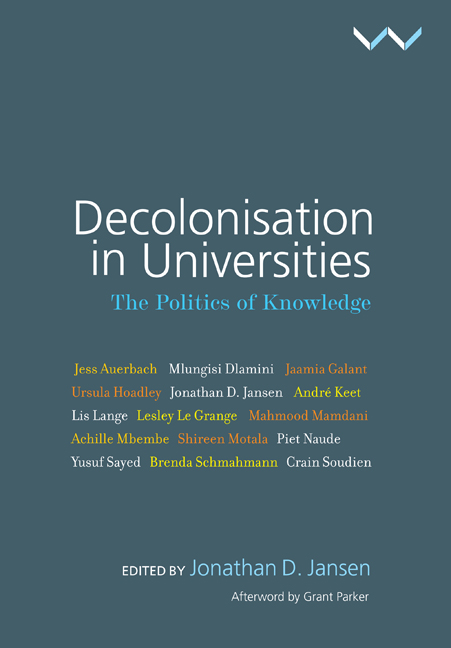Book contents
- Frontmatter
- Contents
- List of Figures
- Acronyms and Abbreviations
- Introduction and Overview: Making Sense of Decolonisation in Universities
- PART 1 THE ARGUMENTS FOR DECOLONISATION
- PART 2 THE POLITICS AND PROBLEMS OF DECOLONISATION
- PART 3 DOING DECOLONISATION
- PART 4 REIMAGING COLONIAL INHERITANCES
- Chapter 9 Public Art and/as Curricula: Seeking a New Role for Monuments Associated with Oppression
- Chapter 10 The Plastic University: Knowledge, Disciplines and the Decolonial Turn
- Chapter 11 Decolonising Knowledge: Can Ubuntu Ethics Save Us from Coloniality? (Ex Africa Semper Aliquid Novi?)
- Chapter 12 Future Knowledges and Their Implications for the Decolonisation Project
- Afterword: Decolonising Minds via Curricula?
- Contributors
- Index
Chapter 12 - Future Knowledges and Their Implications for the Decolonisation Project
from PART 4 - REIMAGING COLONIAL INHERITANCES
Published online by Cambridge University Press: 25 October 2019
- Frontmatter
- Contents
- List of Figures
- Acronyms and Abbreviations
- Introduction and Overview: Making Sense of Decolonisation in Universities
- PART 1 THE ARGUMENTS FOR DECOLONISATION
- PART 2 THE POLITICS AND PROBLEMS OF DECOLONISATION
- PART 3 DOING DECOLONISATION
- PART 4 REIMAGING COLONIAL INHERITANCES
- Chapter 9 Public Art and/as Curricula: Seeking a New Role for Monuments Associated with Oppression
- Chapter 10 The Plastic University: Knowledge, Disciplines and the Decolonial Turn
- Chapter 11 Decolonising Knowledge: Can Ubuntu Ethics Save Us from Coloniality? (Ex Africa Semper Aliquid Novi?)
- Chapter 12 Future Knowledges and Their Implications for the Decolonisation Project
- Afterword: Decolonising Minds via Curricula?
- Contributors
- Index
Summary
The experience of student protests in South Africa has generated difficult but necessary debates about whiteness and the damage resulting from institutionalised racial hierarchies and violence. It has forced upon us new questions about what counts as knowledge and why. It has also obliged society at large to reflect on whether academic institutions can be turned into spaces of radical hospitality and if so, how, for whom and under what conditions; or whether they are simply sites that replay power relations already existing within society. Moreover, it has brought back to the centre perennial ‘postcolonial dilemmas’ such as: What should we do with institutions inherited from a cruel past? Are such institutions ‘reformable’ or should they simply be ‘decommissioned’ or, for that matter, literally burnt down in the hope that from the ashes, something new will eventually emerge (Ndebele 2016)?
At the core of these events is the hope, especially among the youth, for something new, which would not simply be a repetition of what we thought we had got rid of (Mbembe 2017). It is this hope that explains the renewed injunction to decolonise institutions, or for that matter, knowledge itself.
Calls to ‘decolonise’ are not new. In the 1960s, 1970s and 1980s they were issued under different names, the most recognisable of which were ‘Africanisation’, ‘indigenisation’, ‘endogenisation’ and so on. So far – and as far as Africa is concerned – the decolonising injunction has mostly consisted of a critique of the colonial knowledge chain (what is taught, produced and disseminated) and a denunciation of its deleterious effects on the African society, culture and psyche. To be sure, a lot of resources have been invested in the study of ‘indigenous knowledge’ or ‘technological systems’ (Mavhunga 2014; Hountondji 1997). Most of these studies could in fact be assembled under the rubric of ethno-knowledges, so tight are their connections with the politics of identity and ethnicity (for a critique, see Comaroff and Comaroff [2009]).
But we still do not have a precise idea of what a ‘truly decolonised knowledge’ might look like. Nor do we have a theory of knowledge as such that might compellingly underpin the African injunction to decolonise.
- Type
- Chapter
- Information
- Decolonisation in UniversitiesThe Politics of Knowledge, pp. 239 - 254Publisher: Wits University PressPrint publication year: 2019



